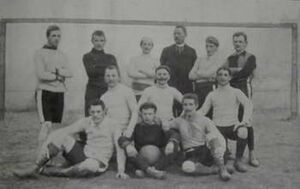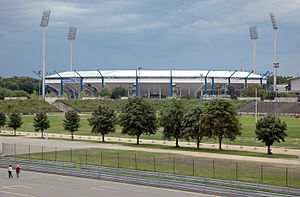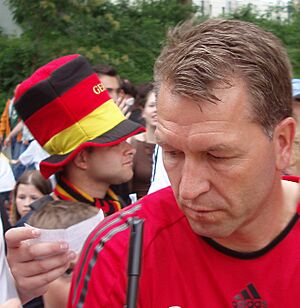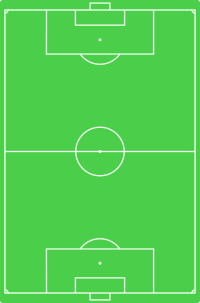1. FC Nürnberg facts for kids
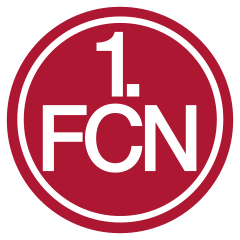 |
||||
| Full name | 1. Fußball-Club Nürnberg Verein für Leibesübungen e. V. | |||
|---|---|---|---|---|
| Nickname(s) | Der Club (The Club) Die Legende (The Legend) Der Ruhmreiche (The Glorious) Der Altmeister (The Old Master) |
|||
| Short name | 1. FCN, FCN | |||
| Founded | 4 May 1900 | |||
| Ground | Max-Morlock-Stadion | |||
| Capacity | 50,000 | |||
| Board member |
|
|||
| Head coach | Miroslav Klose | |||
| League | 2. Bundesliga | |||
| 2020–21 | 2. Bundesliga, 11th of 18 | |||
|
||||
1. FC Nürnberg is a famous German sports club from Nuremberg, Bavaria. It is best known for its men's football team. They currently play in the 2. Bundesliga, which is Germany's second-highest football league.
The club was started on May 4, 1900. They won their first German championship in 1920. Before the top league, the Bundesliga, began in 1963, 1. FC Nürnberg won many regional championships. They were German champions seven more times. The club has won the Bundesliga once and the DFB-Pokal (German Cup) four times.
Since 1963, the team has played its home games at the Max-Morlock-Stadion in Nuremberg. Besides football, the club also has sections for other sports. These include boxing, handball, hockey, swimming, skiing, and tennis.
Nürnberg shares the record for being promoted from the second division to the Bundesliga the most times (8 times). Because of this, they also hold the record for being relegated from the top league nine times.
Contents
Club History
Early Days of "Der Club"
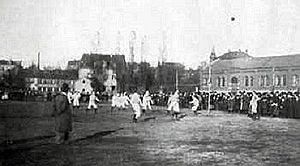
1. FC Nürnberg was founded on May 4, 1900. Eighteen young men met at a pub to create a football team. They wanted to play football instead of rugby, which was also popular then. By 1909, the team was good enough to win the South German championship.
After World War I, Nürnberg became very strong in German football. From July 1918 to February 1922, the team did not lose a single game in 104 official matches. By 1919, people started calling them "Der Club" (The Club). This showed how skilled and popular they were.
Nürnberg played against SpVgg Fürth in the first national championship after World War I. They beat the defending champions 2–0. This was the first of five titles Der Club won in eight years. In all those wins, they did not let their opponents score.
The 1922 final was between Nürnberg and Hamburger SV. But the game never finished. The first match was stopped because it got too dark after three hours and ten minutes. It was a 2–2 tie. The rematch also went into extra time. Nürnberg ended up with only seven players because no substitutions were allowed back then. The referee stopped the game, and the German Football Association (DFB) gave the win to Hamburger SV. However, Hamburger SV gave up the title for "good sportsmanship." So, no team officially won the trophy that year.
After the Golden Age
1. FCN's strong period started to end after they won their last trophy in 1927. Football was changing, becoming faster, which did not suit their slower style. In 1934, they lost in the final to Schalke 04. Schalke 04 became the top team during the time of football in Nazi Germany.
Nürnberg won national titles just before and after World War II. They won in 1936 and again in 1948, which was the first national final after the war. They also won the Tschammerpokal, which is like today's DFB-Pokal, in 1935 and 1939.
Entering the Modern Era
After the war, the club joined the Oberliga Süd. This was one of the five top leagues in West Germany. Nürnberg won this league six times before 1963. They also won the national championship in 1948. In 1961, 1. FCN won their eighth national title. They reached the final again in 1962 but lost. However, they won their second DFB-Pokal in 1962.
Because of their strong play, the club was chosen to be one of the 16 teams in the Bundesliga. This new professional German football league started in 1963. Der Club played well in the early years of the league. In 1968, they had a fantastic season. They were at the top of the league from the fifth week until the end. This led to their first Bundesliga title.
However, they became the first defending champions to be relegated from the Bundesliga. This happened because their coach, Max Merkel, changed almost the entire team. He thought the older, championship-winning players were too old.
It took the club nine years to return to the top league. They had played in the second tier during this time. 1. FCN returned to the Bundesliga in 1978 for one year but were relegated again. Since then, their Bundesliga performance has often been in the lower parts of the table. They have been relegated several times. Their best result in recent decades was finishing fifth in 1988.
In the early 1980s, a strong friendship grew between the fans of Nürnberg and Schalke 04. Fans often travel to each other's away games. Matches between these two teams are usually very friendly.
In the mid-1990s, Nürnberg had money problems. Their club treasurer was found guilty of fraud. This led to them losing six points in the 1995–96 season while in the 2. Bundesliga. As a result, the club was relegated to the third division. They slowly improved in the following seasons.
In 1999, 1. FCN had a very tough end to the Bundesliga season. Going into the last game, they were in 12th place. They were three points and five goals ahead of Eintracht Frankfurt, who were in 16th place. Nürnberg lost their last home game 2–1. Frankfurt won their match 5–1. This meant Nürnberg was relegated because they had scored fewer goals than Frankfurt, even though their points and goal difference were similar. It was a big shock.
21st Century Challenges
1. FCN bounced back and returned to the Bundesliga. But they still often had to fight against relegation. However, in the 2005–06 season, they finished eighth. This showed they were becoming a stronger team. In May 2007, they qualified for the UEFA Cup. They then won the DFB-Pokal final against VfB Stuttgart 3–2 after extra time. This was their first German Cup win in 45 years.
In the 2007–08 season, the team did not play well in the Bundesliga. They were relegated again after losing to Schalke 04 on the final day. After a slow start, Michael Oenning helped Nürnberg finish third in the 2. Bundesliga. They won a play-off against Energie Cottbus to return to the Bundesliga.
However, they were demoted again after the 2013–14 season. They finished 17th after another final day loss to Schalke 04. The club finished third in the 2015–16 season. They qualified for the promotion play-off but lost to Eintracht Frankfurt. So, they stayed in the 2. Bundesliga.
In the 2017–18 season, they finished 2nd. This earned them a direct promotion spot back to the Bundesliga. But they finished last in the top league the next season and were relegated once more.
In the 2019–20 2. Bundesliga season, they finished 16th. This meant they had to play a relegation play-off against 3. Liga team Ingolstadt. The total score was 3–3, but Nürnberg won because they scored more away goals. The goal that saved them was scored in the sixth minute of injury time in the second game. This kept them in the second tier at the very last moment.
Club Rivals
SpVgg Greuther Fürth is 1. FCN's oldest local rival. Their rivalry goes back to the early days of German football. At times, these two clubs were the best in the country. They have played 258 matches against each other, which is the most in German professional football.
In 1921, the German national team was made up only of players from Nürnberg and Fürth. They traveled on the same train to a match against the Netherlands. But the Nürnberg players were in the front carriage, and the Fürth players were in the back! A Fürth player scored the first goal, but only his Fürth teammates congratulated him. It is even said that a former Fürth player, Hans Sutor, had to leave the team because he married a woman from Nuremberg. He later joined 1. FC Nürnberg and helped them win three national championships. Both clubs played in the Bundesliga together in the 2012–13 season.
Games against Bayern Munich are also very important. These two clubs are the most successful in Bavaria and in Germany overall.
Reserve Team
The 1. FC Nürnberg II is the club's reserve team. They play in the tier four Regionalliga Bayern.
League Results
Recent Seasons
Here's how the club has performed in the 21st century:
- Key
| ↑ Promoted | ↓ Relegated |
| Season | Division | Tier | Position |
| 2000–01 | 2. Bundesliga | II | 1st ↑ |
| 2001–02 | Bundesliga | I | 15th |
| 2002–03 | Bundesliga | 17th ↓ | |
| 2003–04 | 2. Bundesliga | II | 1st ↑ |
| 2004–05 | Bundesliga | I | 14th |
| 2005–06 | Bundesliga | 8th | |
| 2006–07 | Bundesliga | 6th | |
| 2007–08 | Bundesliga | 16th ↓ | |
| 2008–09 | 2. Bundesliga | II | 3rd ↑ |
| 2009–10 | Bundesliga | I | 16th |
| 2010–11 | Bundesliga | 6th | |
| 2011–12 | Bundesliga | 10th | |
| 2012–13 | Bundesliga | 10th | |
| 2013–14 | Bundesliga | 17th ↓ | |
| 2014–15 | 2. Bundesliga | II | 9th |
| 2015–16 | 2. Bundesliga | 3rd | |
| 2016–17 | 2. Bundesliga | 12th | |
| 2017–18 | 2. Bundesliga | 2nd ↑ | |
| 2018–19 | Bundesliga | I | 18th ↓ |
| 2019–20 | 2. Bundesliga | II | 16th |
| 2020–21 | 2. Bundesliga | 11th | |
| 2021–22 | 2. Bundesliga | 8th | |
| 2022–23 | 2. Bundesliga | 14th | |
| 2023–24 | 2. Bundesliga | 12th | |
| 2024–25 | 2. Bundesliga | 10th | |
| 2025–26 | 2. Bundesliga |
All-Time League Performance

the highest level of football in Germany; the second highest; the third highest.
Club Achievements
For over 60 years, Der Club held the record for winning the most German championships. This was before Bayern Munich took over the record in 1987.
Germany honors its Bundesliga champions with gold stars. One star is for three titles, two for five, and three for ten. However, only titles won since 1963 in the Bundesliga are officially counted for these stars. Even though Nürnberg has won the national title nine times, they do not get to wear any championship stars. This is because most of their wins were before the Bundesliga started.
League Titles
- German Football Championship/Bundesliga
- Champions: 1920, 1921, 1924, 1925, 1927, 1936, 1948, 1961, 1967–68
- Runners-up: 1934, 1937, 1961–62
- 2. Bundesliga/2. Bundesliga Süd
- Champions: 1980, 1985, 2001, 2004
Cup Wins
- DFB-Pokal
- Winners: 1935, 1939, 1961–62, 2006–07
- Runners-up: 1940, 1981–82
European Competitions
- European Cup
- Quarter-finals: 1961–62
- European Cup Winners' Cup
- Semi-finals: 1962–63
- Intertoto Cup
- Group Winners: 1968
Regional Titles
- Süddeutsche Meisterschaft
- Champions: 1916, 1918, 1920, 1921, 1924, 1927, 1929
- Ostkreis-Liga
- Champions: 1916, 1918
- Kreisliga Nordbayern
- Champions: 1920, 1921
- Bezirksliga Bayern
- Champions: 1924, 1925, 1927
- Bezirksliga Nordbayern
- Champions: 1929, 1932, 1933
- Gauliga Bayern
- Champions: 1934, 1936, 1937, 1938, 1940
- Oberliga Süd
- Champions: 1947, 1948, 1951, 1957, 1961, 1962
- Regionalliga Süd (II)
- Champions: 1971
- Southern German Cup
- Winners: 1919, 1924
Home Stadium
"Der Club" plays its home games at the Max-Morlock-Stadion. This stadium is owned by the community. It has been the club's home since 1963. The stadium can hold 50,000 fans after its most recent upgrade in 2009–10. Before this, the club played at a ground called Zabo.
The stadium was built in 1928. It was known by different names over the years. It was called the Frankenstadion (Franconia Stadium) for a long time. It could originally hold 40,000 people. It was made bigger in 1965 to hold 65,000 fans. It hosted the 1967 Cup Winners' Cup final. The stadium was also updated for the 1974 FIFA World Cup and the 2006 FIFA World Cup. For the 2006 World Cup, it could seat 45,000 people.
From 2012, the stadium was called "Grundig Stadion" for a while due to a sponsorship deal. However, most fans wanted it named after club legend Max Morlock. His name was finally used in 2017.
The club looked into building a new stadium in the 2010s. It would have been built in the same spot and hold 50,000 fans. But no official plans for a new stadium were announced. Nuremberg was not chosen as a host city for the UEFA Euro 2024 tournament.
Team Kits
| Years | Kit manufacturer | Shirt sponsor |
|---|---|---|
| 1985–87 | Adidas | Patrizier |
| 1987–93 | Reflecta | |
| 1993–94 | Puma | Trigema |
| 1994–96 | ARO | |
| 1996–98 | Adidas | |
| 1998–00 | VIAG Interkom | |
| 2000–02 | Adecco | |
| 2002–03 | Entrium Direct Bankers AG | |
| 2003–04 | DiBa Bank | |
| 2004–08 | mister*lady | |
| 2008–12 | Areva | |
| 2012–14 | NKD | |
| 2014–16 | Wolf Möbel | |
| 2016–21 | Umbro | Nürnberger Versicherung |
| 2021– | Adidas |
Players
Current Squad
|
|
Players on Loan
|
|
Notable Former Players
Greatest Ever Team
In 2010, for the club's 110th anniversary, fans voted for the best players in the club's history. The players with the most votes for each position were named in the club's greatest ever team.
 Andreas Köpke
Andreas Köpke Ferdinand Wenauer
Ferdinand Wenauer Thomas Brunner
Thomas Brunner Andreas Wolf
Andreas Wolf Stefan Reuter
Stefan Reuter Hans Dorfner
Hans Dorfner Reinhold Hintermaier
Reinhold Hintermaier Marek Mintál
Marek Mintál Max Morlock
Max Morlock Saša Ćirić
Saša Ćirić Dieter Eckstein
Dieter Eckstein
Reserves: Hans Kalb, Stefan Kießling, Horst Leupold, Dieter Nüssing, Marc Oechler, Luitpold Popp, Raphael Schäfer, Heinz Strehl, Heinrich Stuhlfauth, Horst Weyerich, Sergio Zárate
Player Records
| Rank | Name | Years | Bundesliga | 2.Liga | Total |
|---|---|---|---|---|---|
| 1 | 1980–1996 | 328 | 74 | 402 | |
| 2 | 2001–2007, 2008–2017 | 250 | 108 | 358 | |
| 3 | 1986–1994, 1999–2001 | 280 | 58 | 338 | |
| 4 | 1975–1984 | 154 | 146 | 300 | |
| 5 | 1975–1988 | 139 | 131 | 270 | |
| 6 | 2005–2015 | 202 | 58 | 260 | |
| 7 | 1975–1983 | 118 | 131 | 249 | |
| 8 | 1989–1999 | 163 | 77 | 240 | |
| 9 | 1976–1985 | 132 | 98 | 230 | |
| 10 | 1998–2007 | 141 | 87 | 228 |
| Rank | Name | Years | Bundesliga | 2.Liga | Total | Ratio |
|---|---|---|---|---|---|---|
| 1 | 1984–1988, 1991–1993 | 66 (189) | 13 (37) | 79 (226) | 0.35 | |
| 2 | 1963–1970 | 76 (174) | 0 (0) | 76 (174) | 0.44 | |
| 3 | 1974–1979 | 0 (9) | 71 (118) | 71 (127) | 0.56 | |
| 4 | 2003–2011 | 32 (121) | 34 (59) | 66 (180) | 0.37 | |
| 5 | 1965–1968, 1971–1972 | 50 (97) | 0 (0) | 50 (97) | 0.52 | |
| 6 | 1976–1985 | 21 (132) | 27 (98) | 48 (230) | 0.21 | |
| 7 | 1968–1977 | 5 (23) | 39 (109) | 44 (132) | 0.33 | |
| 8 | 1998–1999, 2002–2004 | 25 (55) | 18 (37) | 43 (92) | 0.47 | |
| 9 | 1975–1988 | 18 (139) | 21 (131) | 39 (270) | 0.14 | |
| 10 | 1965–1969, 1980–1981 | 37 (136) | 0 (0) | 37 (136) | 0.27 |
Numbers in brackets indicate appearances made.
Club Staff
| Head coach | |
| Assistant coach | |
| Assistant coach | |
| Goalkeeping coach | |
| Fitness coach |
Coaches and Chairmen
Coaches
Many great coaches have led 1. FC Nürnberg. Some famous ones from earlier years include Izidor "Dori" Kürschner and Fred Spiksley. Also, former players like Alfred Schaffer and Hans "Bumbes" Schmidt were important coaches. Schmidt won three German Championship titles with rival team Schalke 04. He also won four titles as a player, three with Der Club.
Coaches in the Bundesliga Era
|
|
Chairmen
- 1900–1904: Christoph Heinz
- 1904–1910: Ferdinand Küspert
- 1910–1912: Christoph Heinz
- 1912–1914: Leopold Neuburger
- 1915–1917: Ferdinand Küspert
- 1917–1919: Konrad Gerstacker
- 1919–1921: Leopold Neuburger
- 1921–1923: Ludwig Bäumler
- 1923: Eduard Kartini
- 1923–1925: Max Oberst
- 1926–1930: Hans Schregle
- 1930–1935: Ludwig Franz
- 1935–1945: Karl Müller
- 1945–1946: Hans Hofmann
- 1946–1947 Hans Schregle
- 1947–1948: Hans Hofmann
- 1948–1963: Ludwig Franz
- 1963–1964: Karl Müller
- 1964–1971: Walter Luther
- 1971–1977: Hans Ehrt
- 1977–1978: Lothar Schmechtig
- 1978–1979: Waldemar Zeitelhack
- 1979–1983: Michael A. Roth
- 1983–1991: Gerd Schmelzer
- 1991–1992: Sven Oberhof
- 1992–1994: Gerhard Voack
- 1994 Georg: Haas
- 1994–2009: Michael A. Roth
- 2009–2010: Franz Schäfer
See also
 In Spanish: 1. F. C. Núremberg para niños
In Spanish: 1. F. C. Núremberg para niños
 | Isaac Myers |
 | D. Hamilton Jackson |
 | A. Philip Randolph |


